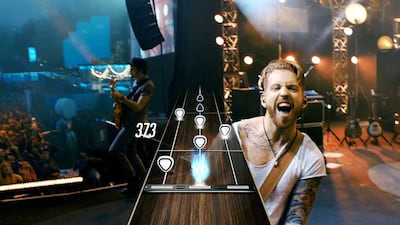Guitar Hero is set for a comeback tour. The publisher Activision Blizzard last week announced plans to resurrect the once-popular video-game franchise, which required players to rhythmically tap guitar-shaped controllers in time to music from many of the world's top bands.
The new entry, due for release in the autumn, will be called Guitar Hero Live and introduce to the series a redesigned guitar, live-action actors (rather than the cartoon-style animated characters of the previous games) and an online music video network.
"We said we would bring it back when we've got true innovation," says Jamie Jackson, the creative director at Guitar Hero Live developer FreeStyleGames, who previously worked on Sing Party and the DJ Hero series.
“We wouldn’t have come back if we didn’t think we were giving you a new experience. We genuinely feel like we’ve nailed it with innovation.”
Guitar Hero Live will cast players as an up-and-coming guitarist in a fictitious band. Instead of looking at a computer-generated avatar playing along with a cartoon band on-screen, wannabe rockers will now get a first-person view of their bandmates and audiences, portrayed by human actors. As in previous games, the crowd will boo or cheer, depending on how well the player is hitting the notes.
“We want you to feel like a rock star again,” said Jackson. “We want to put you on stage, whether it’s in front of 100 people, 1,000 people or 100,000 people. We want you to experience what it feels like to perform on stage. That’s why we’ve turned the camera around and made it first-person. As we were working on this, we actually code-named it ‘Stage Fright’.”
Although the game will, like the previous versions, feature original music performed by artists such as The Rolling Stones, Ed Sheeran, Green Day, The Black Keys, The Killers and Fall Out Boy, Guitar Hero Live will forgo digital likenesses of the musicians in favour of actors portraying fake band members.
The other major change is to the buttons the player presses on the neck of the guitar. The familiar colour-coded, five-button system has gone, replaced by two rows of three. Jackson said the new six-button configuration would provide veteran players with a bigger challenge and more closely mimic the act of playing real chords, while still be simple and enjoyable for new and more casual players.
For the game's online mode, FreeStyleGames has created a music-video network called GHTV. The original mode allows players to compete against each other – online or in person – against the backdrop of music videos. Access to it will be included in the game's US$99.99 (Dh367) price tag.
At its height in 2009, the Guitar Hero series topped $2 billion in sales but popularity waned and Activision put the franchise on hold in 2011 after Guitar Hero: Warriors of Rock.
"For us, five years is an eternity," said Tyler Michaud, the director of product management at Activision. "With the new cycle of consoles, it felt like the right time to return. Nothing about it is analogous to the old Guitar Hero. The note tracking, guitar and visuals are all different and GHTV is an all-new concept. It's a completely new game from the ground up."
The Guitar Hero revival follows last month's tease from Rock Band developer Harmonix that it is bringing back its own series. Unlike Guitar Hero Live, Harmonix said Rock Band 4 would seek to be fully backward compatible, meaning previously purchased songs and controllers can be used with the new game.
artslife@thenational.ae

